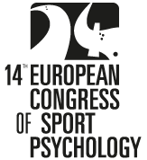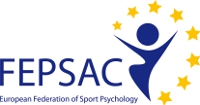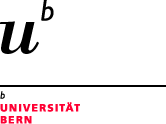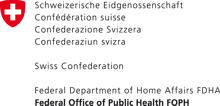Keynote speakers
|
|
Abstract: A team is an interdependent group of three or more people who have different roles and who interact with one another toward a common goal. Teams can engage in physical activities as a unit (e.g., move a soccer ball toward a goal), as well as cognitive activities (e.g., strategize about how to best work through the other team's defense). [read more…]
Team cognition is the execution of these cognitive activities (e.g., perception, planning, decision making) at a team level and is critical for team effectiveness to the extent that a team task requires cognitive processing. Team sports are cognitive tasks in the sense that they require cognitive processing among team members.
One explanation of team cognition involves the concept of a shared mental model. Shared mental model theories posit that team members will be effective to the extent that they share knowledge of the task and team (Cannon-Bowers, Salas, & Converse, 1993). Measures of shared mental models typically involve aggregation of knowledge measured at the individual level. These theories tend to focus on knowledge as opposed to cognitive process and provide reasonable explanations of team cognition for tasks that are heavily knowledge-based such as team research or team writing. However, this rather static knowledge-centric view of team cognition does not explain the more dynamic cognition that plays out over time as a team, such as a soccer team, coordinates and executes plays. A series of experiments conducted in a synthetic testbed that simulates the team control of a remotely piloted aircraft, supports the importance of cognitive processing over shared knowledge (Cooke, Gorman, Myers, & Duran, 2013). As teams in that environment became more effective, cognitive processing improved, but not knowledge sharing (Cooke, Kiekel, & Helm, 2001). Further, teams who were trained by perturbing the cognitive processing became more adaptive than those who were cross-trained to promote knowledge sharing (Gorman, Cooke, & Amazeen, 2010). These and other results have supported a theory of Interactive Team Cognition with three underlying assumptions:
References Cannon-Bowers, J. A., Salas, E., & Converse, S. (1993). Shared mental models in expert team decision making. In J. Castellan Jr. (Ed.), Current issues in individual and group decision making (pp. 221–246). Hillsdale, NJ: Lawrence Erlbaum. Cooke, N. J., Gorman, J. C., Myers, C. W., & Duran, J.L. (2013). Interactive Team Cognition, 37, Cognitive Science, 255-285, DOI: 10.1111/cogs.12009. Cooke, N. J., Kiekel, P. A., & Helm E. (2001). Measuring team knowledge during skill acquisition of a complex task. International Journal of Cognitive Ergonomics: Special Section on Knowledge Acquisition, 5, 297-315. Gorman, J. C., Cooke, N. J., & Amazeen, P. G. (2010). Training adaptive teams. Human Factors, 52, 295-307. [Winner of HFES 2010 Jerome Ely Award] Gorman, J.C., Cooke, N. J., & Winner, J.L. (2006). Measuring team situation awareness in decentralized command and control systems. Ergonomics, 49, 1312-1325. Nancy J. Cooke is a professor of Cognitive Science and Engineering at Arizona State University and is Science Director of the Cognitive Engineering Research Institute in Mesa, AZ. Dr. Cooke received her BA in Psychology at George Mason University and her MA in Experimental Psychology and PhD in Cognitive Psychology from New Mexico State University. She has held faculty positions at Rice University and New Mexico State University. Dr. Cooke is a member of the National Research Council's Panel on Human Factors Science at the Army Research Laboratory and chairs the National Research Council's Board on Human Systems Integration and a study panel on the Science of Team Science. Dr. Cooke's research interests include the study of individual and team cognition with applications to the development of cognitive and knowledge engineering methodologies, cognitive task analysis, sensor operator threat detection, homeland security systems, unmanned aerial systems, cyber defense, healthcare systems, human-robot teaming, and emergency response systems. In particular, Dr. Cooke specializes in the development, application, and evaluation of methodologies to elicit and assess individual and team cognition. Based on her empirical work in her synthetic task environments for teams over the last two decades, Dr. Cooke has developed a theory of Interactive Team Cognition which is published (with Gorman, Myers, & Duran) in the journal, Cognitive Science. Dr. Cooke's research has been funded by the US Office of Naval Research, the Air Force Research Lab, the Air Force Office of Scientific Research, and the Army Research Office. [read less…] |
|
|
Abstract: As exercise psychology approaches its first half-century mark, it is time for critical introspection. If judged by conventional academic metrics (e.g., books and journal articles produced, research funds generated), the field has experienced meteoric growth. However, from a less charitable perspective, exercise psychology has arguably yet to fully establish its societal relevance, having failed to deliver methods for reliably increasing physical activity participation and adherence.
Indeed, a critic could argue that the field is rapidly approaching (or has already reached) its first paradigmatic crisis, given that its theoretical models offer remarkably poor accounts of its central phenomenon of interest, namely physical activity behavior.
These theoretical models represent derivatives of cognitivism, the dominant paradigm in psychology since the 1960s and the only paradigm exercise psychology has ever known. In cognitivist theories, humans are described as collecting relevant information (e.g., about personal agency, benefits versus barriers, sources of social support), weighing pros and cons, making probabilistic predictions about the future consequences of their actions and inactions, and making behavioral decisions on this basis. Scrutiny of the core postulates and fundamental assumptions of cognitivism, however, raises some legitimate questions. Are human behavioral decisions fully rational? Is the provision of information the only (or the best) way to change behavior? Are cognitive appraisals always stronger determinants of behavior than physical or biological factors? While the conversation on these essential issues has been ongoing in other fields (e.g., behavioral economics), it has yet to be initiated in exercise psychology. By most indications, post-cognitivist theorizing will likely reflect a "dual-process" conceptualization. "System 1" ("Old mind"), whose importance has been grossly underappreciated so far, is presumed to rely on implicit knowledge, largely inflexible and automatic responses, and evolutionarily primitive affective learning (i.e., the pursuit of pleasure and avoidance of displeasure). "System 2" ("New mind") is more closely aligned with the view of the mind on which cognitivist models were based (i.e., relies on explicit knowledge, is flexible and sophisticated, operates on formal reasoning). A crucial step for the transition of exercise psychology to the post-cognitivist era will be a broad agreement on the need to develop exercise-specific theoretical models, recognizing the unique features and challenges of this particular behavior (distinct from other health or social behaviors). Arguably, at the core of this uniqueness lies a profound conflict between "System 1" and "System 2," such that, while most adults recognize the health benefits of exercise, they tend to regard exercise as unpleasant or inadequately pleasant to compete against other, more pleasant options vying for a portion of their discretionary time. To prepare for the transition to this type of dual-process theorizing, researchers in exercise psychology will have to strengthen their understanding of a wide array of relevant affective constructs, from the sense of somatic exhaustion and pain to culturally framed emotions, such as shame and embarrassment. This represents a substantial challenge, not only because these constructs (and their motivational implications) have so far been neglected but also because the theoretical and empirical literature on affective phenomena is notoriously convoluted. Thus, approaching this area with due deference to its long history, richness, complexity, and nuances will be essential. Besides continuing to investigate the cognitive underpinnings of exercise behavior, future basic research based on dual-process models will have to deepen the current understanding of the mechanisms underlying the regulation of affect during exercise and the processes by which exercise experiences register in memory as pleasant or unpleasant. Based on these theoretical advances, future applied research will have to reimagine what a bout of "exercise" or "physical activity" is or should be, with the promotion of pleasure as a central consideration. Panteleimon ("Paddy") Ekkekakis received his Bachelor's degree in exercise science from the University of Athens in his native Greece before immigrating to the United States in 1993. After obtaining a Master's from Kansas State University (1996) and a doctorate from the University of Illinois (2000), he started his career as an academic at Iowa State University, where he has been for over 15 years. His research examines affective responses to exercise, including their underlying cognitive and neurobiological mechanisms, and their implications for subsequent exercise behavior. Since he started publishing his research in this area, the number of articles in scientific databases combining the keywords "exercise" or "physical activity" with "affect," "mood," or "emotion" grew from approximately 100 to over 600 per year, most containing citations to his work.The methodological platform, the assessment tools, and the "dual-mode" theoretical framework that he has proposed have become literature standards. His current research focuses on the development of a theory of the sense of fatigue and the elaboration of the hedonic theory of exercise behavior. Ekkekakis is the author of The Measurement of Affect, Mood, and Emotion: A Guide for Health-Behavioral Research (Cambridge University Press, 2013), the editor-in-chief of the Handbook of Physical Activity and Mental Health (Routledge, 2013), and co-editor of the Psychobiology of Physical Activity (Human Kinetics, 2006). He serves on the editorial board of several journals, including the Journal of Sport and Exercise Psychology, Psychology of Sport and Exercise, Mental Health and Physical Activity, and Sport, Exercise, and Performance Psychology. [read less…] |
|
Research over the past 20 years has shown that problems related to sexualized bullying, gender and sexual harassment, and abuse occur in sports. Many people are unaware of how these concepts are defined and their meaning. I will therefore start with defining and discussing these concepts, with a focus on the implications or challenges they may have with respect to methodology. Central in the definitions is that the behaviour experienced is unwanted or threatening, troublesome, insulting, offensive or forced, and common for sexual harassment, and abuse is-- that they stem from power relationships and the abuse of power by the more powerful person in the relationship. Based on international studies, I will present a brief overview of what we know about the prevalence. This shows that the prevalence data vary a lot between the different studies, which seems to be due to different definitions and measurements. Further the impact of sexual harassment and abuse, with a focus on the psychological impacts are presented. This is followed by the known risk factors, which primarily include the normalization of what might constitute psychologically abusive coaching practices, and a socio‐cultural context with norms based very much on power and hierarchical relations. This review of 'what do we know' will be followed by a short discussion of theories or models that have been developed to try to explain why sexual harassment and abuse occurs. The focus on the next part of the presentation will be on prevention. One national and one international example will be presented. The national illustration will be from my own country and the work done by the Norwegian Olympic, Paralympic and Confederation of Sports (NIF). It decided in 2009 that all sports clubs would be "obliged to procure a police certificate of good conduct for persons who are to carry out tasks for the club that entail a relationship of trust and responsibility in relation to minors or persons with mental disability." Ten new guidelines for preventing sexual harassment and abuse were also adopted by NIF in 2010 and will be outlined. The international example is from the International Olympic Committee (IOC). The IOC adopted a position statement in 2007 on the prevention of sexual harassment and abuse in sport. It was followed up by developing interactive educational tools for sport organizations, coaches and athletes. The presentation of some of these videos can be looked upon as an introduction to the final part of the presentation, in which I will discuss implications for sport psychologists, with a focus on the bystander effect. The bystander effect refers to the situation where the victim perceives that others know about, (or suspect) what is going on, but do not do anything about it. Another important implication of the knowledge that has been developed over the last years is the importance of education, for everyone in sport including the psychologists that are working with the athletes. A prerequisite should be that sport psychologists work in an environment in which the organizations have a protection policy and procedure in place, which also should include codes of conduct and the screening of all personnel including the sport psychologists themselves. Kari Fasting is Professor Emerita at the Department of Social and Cultural Studies at the Norwegian School of Sport Sciences in Oslo, Norway. She became the first elected chair of this institution and served as the rector from 1989 to 1994. She was also the first president of the Norwegian Society for Sport Research (1983) and is past president and honorary member of the International Sociology of Sport Association. She was a founding member of WomenSport International (WSI), and has served as the president of this organization. Kari Fasting has over 300 publications, is an often invited keynote speaker to international conferences, and has received many awards for her work, among others an honorary doctorate at the University of Bern in 2013. Her research areas the last 30 years has been concerned with various aspects related to "equality and diversity" in sport, with a focus on sport and exercise in the lives of women, and has worked as an expert consultant for European Union and Council of Europe on issues related to gender equality in sport. The main focus of her research during the last fifteen years has been on sexual harassment and abuse in sport. In this area she has chaired a comparative European project in Czech Republic, Greece and Norway and has worked as an expert consultant for The Norwegian Olympic Committee, IOC and UNICEF in developing international programs and policies for preventing harassment and abuse to occur in sport. [read less…] |
|
Abstract: The phrase "Doing sport psychology" can be interpreted and debated in a number of ways through the lenses of varying stakeholders in our profession. We may each "do sport psychology" through our scholarly research activity, our education and teaching activity, and our practitioner consulting activity. In this presentation, this process from applied research-to-teaching excellence-to-applied practice sustains the ongoing health and development of our profession(s).
Drawing from personal experiences and case examples, I will present critical reflections of personal research that has attempted to scientifically inform practice in youth athletes, professional teams, coaches, and parents over the past 20 years. Equally, I will reflect on personal experiences and turning points of consulting within sport teams and organisations, and consider the demands placed upon the practitioner at social, cognitive, developmental, organisational and cultural levels. These reflections incite a range of thoughts, emotions and implications, and will provoke commentary on a range of professional, methodological, and institutional challenges for sport psychology. Ultimately, this lecture aims to promote critical thinking within the community of sport psychologists in research and teaching institutions, sport organisations and businesses about how to collaborate effectively for the long term well-being and growth of the profession.
Chris Harwood, PhD is a Reader in Applied Sport Psychology at Loughborough University, UK. His research interests lie in the psychosocial aspects of youth sport and athlete development with a particular focus on the practical roles of coaches and parents in the wider social environment. His motivation to promote the industry of applied sport psychology and appropriate training and development for practitioners has also led to several publications within the field of professional practice. He served as the Vice-President of the European Federation of Sport Psychology (FEPSAC) from 2007-2011, and as an Associate Editor for the Journal of Applied Sport Psychology from 2009-2014. Alongside JASP, he is currently an editorial board member for The Sport Psychologist, the Journal of Sport Psychology in Action. Beyond his academic work, Chris is a HCPC Registered Practitioner Psychologist and holds dual accreditations with the British Association of Sport and Exercise Sciences (BASES) and British Psychological Society (BPS). He held the position of Club Psychologist for Nottingham Forest Football Club and continues to mentor a number of youth football academy psychological support programmes. Recently, Chris served a three year tenure as the Lead Sport Psychologist for the Lawn Tennis Association on a part-time basis, and continues to provide psychological services to players, parents and coaching staff. He is a Fellow of both AASP and BASES, and an active supervisor and assessor for the BPS practitioner qualification. In his spare time, he continues to compete as a national veteran tennis player and maintains his passion for running, golf and movies. [read less…] |
|
Abstract: The importance of physical activity for the improvement and preservation of cognitive abilities has repeatedly been examined. However, the approaches in these studies vary and the underlying mechanisms are still not clear. One line of research looks at the simultaneous performance of a motor and cognitive task (dual-task paradigms); while others investigate the association between cognitive performance and the overall fitness level of a person or the effects of a (long-term) fitness intervention on cognitive functioning. A third line of research looks at the immediate effects of acute bouts of exercise on cognitive functioning. [read more…]
Most exercise paradigms have utilized cardiovascular exercise, also referred to as aerobic or cardiorespiratory exercise, where highly automated movements like walking or cycling are performed. Physical activity, however, is manifold. Unlike cardiorespiratory exercise, coordination training comprises exercises for fine and gross motor body coordination such as balance, eye-hand coordination, leg-arm coordination as well as spatial orientation and reaction to moving objects/persons. Coordination training induces less change in energy metabolism than cardiovascular exercise. Instead, coordinative movements require perceptual and higher-level cognitive processes, such as attention, that are essential for mapping sensation to action and ensuring anticipatory and adaptive aspects of coordination.
Today there are several neuroimaging methods available to research the effect of physical activity on neuronal changes. Methods used include structural imaging, structural connectivity, resting functioning imaging, and activation imaging techniques. In addition, biochemical approaches are used to disentangle the exercise-cognition-relationships at a cellular level. Results gained by these techniques show different, but in parts complementary results. Different methods provide access to different but interconnected aspects of the neural and physiological basis of activity related changes and how these might be regulated by different cellular mechanisms. During the past years, our research group has conducted studies in children, young and older adults to address the different lines of research and underlying mechanism. In my presentation, I will provide an overview on selective studies investigating acute and chronic effects of exercise in different age groups and discuss potential underlying mechanisms. Further, I will propose possible mechanisms by which physical activity facilitates cognitive performance. Voelcker-Rehage, C. & Niemann, C. (2013). Structural and functional brain changes related to physical activity in different age groups. Neuroscience & Biobehavioral Reviews. 37, 9, 2268-2295. Claudia Voelcker-Rehage is Professor of Human Performance at the Jacobs Center on Lifelong Learning and Institutional Development of Jacobs University Bremen, Germany. She received her PhD in 2002 from University of Bielefeld, Germany and was a Postdoctoral Fellow at the School of Applied Physiology, Georgia Institute of Technology (Atlanta, GA, USA). Claudia is managing director of the German Association of Sport Psychology (asp), Editor in Chief (deputy) of the German Journal of Sports Science, Review Editor of Frontiers in Movement Science, and Speaker of the Motor Behavior Section of the German Society of Sport Science. Further, she is a member of the Center for Cognitive Sciences of University Bremen and the Research Centers AgeAct (Aging – Interaction of Processes) und COSYP (Cognitive Systems and Processes) of Jacobs University Bremen. Her main research interests are lifespan motor development and learning, the connection between motor and cognitive performance, and the benefit of motor performance for lifelong development. Particularly, she is interested in the effects of physical activity and fitness on psychological and neurological functioning, such as cognitive performance, as well as in the analysis of the structure-function relationships between cognitive, sensory-motor performance, and learning, e.g. dual-task performance. Within the area of motor control she examines how age-related changes in manual dexterity might influence activities of daily living and at the workplace and how age-related changes can be positively influenced by practice. Although she is interested in age-related changes across the lifespan, her main focus is in older adults. [read less…] |
|
|
Abstract: Examinations of highly successful people typically focus on de-contextualised and comparative personality traits and behaviours.
To enhance our understanding of the practices of highly successful people across various contexts a more comprehensive and nuanced examination of what underpins their successes is imperative; i.e., why they behave the way they do.
In this keynote, some significant research findings will be presented to provide an insight into what we know about highly successful elite sport coaches and how this understanding might inform coach recruitment and development. Several research studies have yielded interesting insights into the developmental experiences of successful coaches, their most valued characteristics, their motivations and perceived needs, how they draw from the knowledge and experience provided by sport scientists, and their psychological make-up, skills and coping strategies. This research has highlighted some consistent findings (e.g., diligent; typically played the sport they coached; learn mostly through experience and influenced by more knowledgeable others; relevance of life histories to how they coach). Methodologically, these studies have typically focused on either the coach or athlete perspectives and conducted mostly with samples from US, Canada, UK, and Australia. Furthermore, much of this research has been focused on the 'what' of coaching practice (e.g. behaviours, traits) and provides limited understanding of the person-in-context. There is a paucity of research that has examined: (a) consistently successful international coaches from around the world; (b) coach-athlete dyad perspectives; and (c) an examination of who they are (e.g., meaning making) beyond what they do (attributes, behaviours). More recent research has examined a sample of some of the world's most successful coaches. These 'outliers among outliers' have won major international championships with many athletes/teams and in multiple contexts. In this research, fourteen serial winning coaches (SWC) from nine countries contributed multiple data sets that were complemented with data from some of their successful athletes. These data sets yielded a multi-layered understanding of a person using integrated theorising to develop a deeper insight into the coach-in-context. Three key themes emerged from the qualitative data analysis: vision, people and environment. First, a clearly articulated vision of what is necessary to win was central to success. Seeing the 'big picture' and developing and implementing pertinent strategies to make this vision a reality was underscored. Monitoring and regulating action plans was pivotal to achieve that end. Second, the importance of selecting and developing a high performing and cohesive group of people who exude confidence (including the athletes and the support team) was reported. This confidence or belief in all actors was framed as: belief in me (the coach); belief in you (the athlete); belief in us (the wider team). Third, SWC create a winning culture, in which everyone understands and buys into a given set of practices. The internal and culturally assimilated stories narrated by the SWC that gave them meaning and purpose (e.g., role of critical life events, opportunities for development) will be discussed in light of these themes. Although the emergent themes and narratives might suggest a simplistic overview of the coach-athlete-performance relationship, we underscore both the complexity and diversity of elite coaching experiences and how coaches made sense of these events. Identifying a stereotypical serial winning coach is likely impossible; however, the research has identified some common and also several unique qualities and practices that contributed to these highly successful coaches - these were truly outliers in a group of outliers. We propose the following recommendations for coach developers: First, the creation of a comprehensive profiling system that moves beyond traits and identifies deeper insights into the person and the coach-organisational fit. Second, coach agency and engagement in 'blended' learning opportunities are central to development, including the influence of significant others. Third, coach developers should underscore the centrality of intra- and inter-personal knowledge and skills in fostering successful outcomes. Finally, the nature of high performance coaches' work continues to evolve; therefore recruitment and development of the next generation of coaches requires developers to provide complementary learning opportunities that prepares coaches for adapting to these dynamic contexts. Sergio Lara-Bercial is a Senior Research Fellow for the International Council for Coaching Excellence and at Leeds Beckett University in UK. After a short professional career as a basketball player in both Spain and England, Sergio coached high performance basketball for eight years in the English Women First Division and was a Team GB Coach for five years between 2005 and 2009 going to five European Championships. A qualified Physiotherapist, Sergio gained a Master's Degree in Sport Psychology from John Moores University in 2003. In 2008, he started working for Sports Coach UK, the UK's national agency for sport coaching, supporting national federations in the development of their coaching qualifications as well as mentoring coaches on the ground. At Sports Coach UK he also led the development of the UK Coaching Children Strategy and the UK Coaching Children Curriculum. Sergio moved to Leeds Metropolitan University in 2011. He has since led on a number of high profile international projects. He is a co-author of the International Sport Coaching Framework and lead coordinator for the ICCE's Innovation Group of Lead Agencies which brings together 11 of the world's most advanced countries in coach education and development. As part of this strand of work, Sergio co-leads together with Prof. Cliff Mallett from the University of Queensland a unique international research project looking at profiling Serial Winning Coaches, coaches who have repeatedly coached athletes to Gold Medals at Olympic and World Championship level. In other areas of his work, he develops and delivers educational resources for children's coaches and also provides training for business leaders. Dr. Cliff Mallett is an Associate Professor of Sport Psychology and Coaching in the School of Human Movement Studies (SHMS) at the University of Queensland (UQ) in Australia. He is also the Director of the Australian Centre for Sport, Physical and Health Education Research within the SHMS at UQ. Dr Mallett completed his PhD in 2003 at UQ in sport motivation using the lens of self-determination theory. Since then, he has published over 100 peer-reviewed papers and book chapters. His research focuses on sport motivation, motivational climate, and autonomy-supportive coaching (Self-determination theory); mental toughness from a person-in-context perspective; and high performance coach learning and development (workplace learning). He is Co-Chair of Research for the International Council of Coaching Excellence (ICCE) and Associate Editor for the International Sport Coaching Journal (ICCE) and the International Journal of Sport and Exercise Psychology (ISSP). Dr Mallett developed and currently coordinates Australia's leading postgraduate programs in sports coaching, which are delivered exclusively online. He was an Australian Olympic and World Championships coach in track and field (1995-2007) coaching 15 international athletes and national relay teams. Until recently, he was a registered and practising sport psychologist who has consulted and collaborated with many of Australia's leading Olympic and Professional sporting organisations as well as several leading international sporting agencies, including the IAAF and IOC. [read less…] |




























